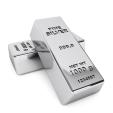Are Weaker Oil Prices and Deflationary Fears Good For Gold?
San Francisco (Aug 4) Dropping oil prices continues to highlight the broad-based weakness in commodity markets, raising deflationary fears amidst another U.S. and global economic slowdown U.S.
However, some analysts note that growing deflation concerns could create a short-term boost for gold as it might keep the Federal Reserve from raise rates, at least in September.
July was not a strong month for gold as prices dropped more than 6%, recording the worst monthly performance in two years. However, gold’s selloff pales in comparison to oil prices, which lost almost 15% last month.
George Davis, chief technical analyst at RBC Capital Markets, said in a recent research report that the drop in gold price highlights the deflationary concerns as global growth concerns continue to linger in the marketplace.
He added that oil will be the market to watch to see if the falling price pressure fears continue to grow or disappear.
He said the 2015 low at $46.16 a barrel, be the critical area to watch, “below which deflationary fears are likely to ignite once again.”
In a report published Monday, Stephen King, senior economic adviser at HSBC, hypothesized that weaker oil and commodity prices are not just a natural readjustment of markets, and agreed that they reflect weakness in the global economy, with China directly “under the spot light.” He explained that even a modest economicOil Poring into Gold slowdown in China has the potential to drive commodity prices “down a long way.”
“Support for the view that falling commodity prices represent a further slowing of global growth comes from a variety of sources. Commodity prices have softened not only in dollar terms but also in euro, yen and sterling terms, suggesting that the strong dollar has played only a secondary role in pushing prices lower,” King said in his report.
King warned that for commodities to reverse their current price rout there has to be meaningful surprises in China’s economy.
However, if weaker global growth and increasing disinflationary pressures persist then central banks looking to raise rates, most notably the Federal Reserve and the Bank of England might have to rethink their policy strategy, he said.
Jim Steel, precious metals strategist at HSBC, commenting on the bank’s economic report, said that that any delay in the Fed Rate hike would be “interpreted as bullion friendly, in our view.”
Sean Lusk, director commercial hedging division at Walsh Trading, said in an interview with Kitco News that although deflationary and disinflation talk is growing, he doesn’t know if it is enough to cause the Fed to “flip-flop” on the direction of their current monetary policy.
“I think talk about deflation is growing and that is helping commodity prices like gold and oil find a near-term bottom but I don’t think we have seen a big enough shift in expectations,” he said.
Lusk noted that from the last Fed statement, the central bank already appears to be preparing for lower oil prices so the latest drop isn’t expected to shift expectations that the Fed will rate interest rates at some point this year.
He added even if the eventual liftoff is pushed back to December, the fact it is only a matter of time before interest rates move higher will continue to weigh on gold.
“I think in this current environment we will continue to see selling into any rallies,” he said.
Lusk added that even if good gets a boost from delayed rate hikes, equity markets would also be driven higher and could eventually sap the yellow metal’s momentum again.
Source: KitcoNews













